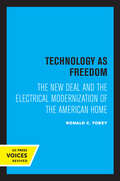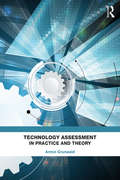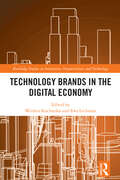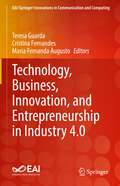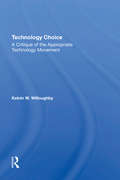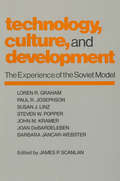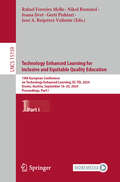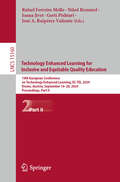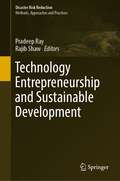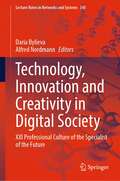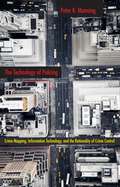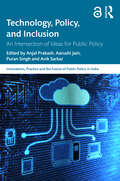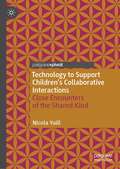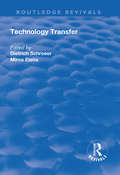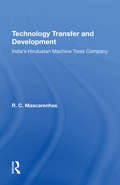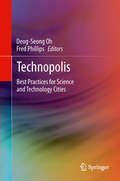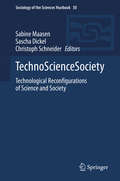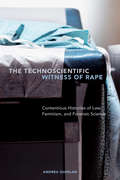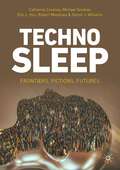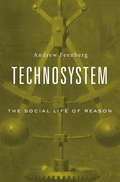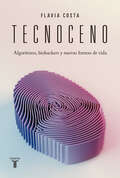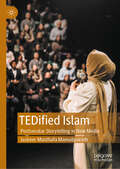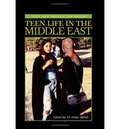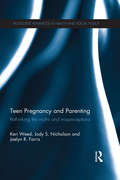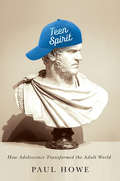- Table View
- List View
Technology as Freedom: The New Deal and the Electrical Modernization of the American Home
by Ronald C. TobeyBefore 1930, the domestic market for electrical appliances was segmented, but New Deal policies and programs created a true mass market, reshaping the electrical and housing markets and guiding them toward mandated social goals. The New Deal identified electrical refrigeration as a key technology to reform domestic labor, raise family health, and build family assets. New Deal incentives led to nearly fifty percent of Title I National Housing Act loans being used to buy electric refrigerators in the 1930s. New Deal policies ultimately created the mass commodity culture of home-owning families that typified the conservative 1950s. This title is part of UC Press's Voices Revived program, which commemorates University of California Press’s mission to seek out and cultivate the brightest minds and give them voice, reach, and impact. Drawing on a backlist dating to 1893, Voices Revived makes high-quality, peer-reviewed scholarship accessible once again using print-on-demand technology. This title was originally published in 1996.
Technology Assessment in Practice and Theory
by Armin GrunwaldTechnological advance affects almost all areas of human life. Rapid digitization, increased mobility, new biotechnologies, and nanotechnology deeply influence, amongst others, industrial production, entertainment, work, military affairs, and individual life. Besides overwhelmingly positive effects on wealth, comfort, innovation, and development, this also raises questions of unintended effects, of tensions with democracy, of the role of citizens, and of its sustainability facing environmental issues. Tools and procedures are needed to cope with this challenging situation. Technology assessment (TA) has been developed more than fifty years ago to enable science, the economy, and society to harvest the potential of new technology to the maximum extent possible and to deal responsibly with possible adverse effects. It was developed more than 50 years ago in the U.S. Congress and has diversified considerably in the meantime. Parliamentary TA in many European states and at the international level, participatory TA at the local and regional levels worldwide, and TA as part of engineering processes are the most relevant fields today. Technology assessment is a growing field of interdisciplinary research and scientific policy advice. This volume (a) gives an overview of motivations of TA, its history and its current practices, (b) develops a fresh theoretical perspective on TA rooted in social theory and philosophy, and (c) draws conclusions from the theoretical perspective for the further development of TA’s practices. It provides the first comprehensive view on the growing field of TA at the international level.
Technology Brands in the Digital Economy (Routledge Studies in Innovation, Organizations and Technology)
by Wioleta Kucharska Ewa LechmanThis edited volume provides deep insight into theoretical and empirical evidence on how digital technologies and high-tech brands are interrelated. It traces the mutual links between these two phenomena, identifies the multidimensionality of interdependencies, and shows the reader how and why new technologies are the driving factors of creation and global dissemination of high-tech brands. In this context, it also refers to various types of economic and social networks that, on the one hand, are the products of digital technologies, while on the other enforce global visibility of high-tech brands. The book contributes to the present state of knowledge, offering the reader broad evidence on how digital technologies impact the process of high-tech brands' nascence and how their growing role and global exposure influence networked economies and societies. It sets out to deliver a bridge between brand management and economical approaches to understanding how digital technologies and high-tech brands are interrelated. This multidisciplinary approach creates a complex compilation of different views and perspectives that sheds new light on the high-tech brands' phenomena of being an input and output of technology-driven economies. Technology Brands in the Digital Economy is written for scholars and researchers from a wide variety of disciplines but especially for those addressing issues of brands and economic development and growth, social development, and the role of technological progress in broadly defined socio-economic progress. It will also be an invaluable source of knowledge for graduate and postgraduate students in a variety of areas such as economic and social development, information and technology, worldwide studies, social policy, and comparative economics.
Technology, Business, Innovation, and Entrepreneurship in Industry 4.0 (EAI/Springer Innovations in Communication and Computing)
by Teresa Guarda Cristina Fernandes Maria Fernanda AugustoThis book presents the most recent innovations, trends, and challenges in several aspects of Industry 4.0, including the key technologies and business impacts. The book is relevant to a variety of stakeholders due to Industry 4.0’s broad impact in many fields. Topics include digital workplace solutions for employee engagement, entrepreneurship and innovation, and Blockchain for business security. The authors cover Industry 4.0 both from a theoretical and applicable standpoint.
Technology Choice: A Critique Of The Appropriate Technology Movement
by Kelvin W WilloughbyThis book attempts to provide a theoretical framework for answering difficult questions evoked by the concept of technology choice primarily by conducting a review of the Appropriate Technology movement and its ideas and experiments.
Technology, Culture and Development: The Experience of the Soviet Model
by James P. ScanlanAlthough scholars have devoted much attention to the impact of technology on society, they have tended to slight the question of how technology is affected by social systems. The authors of this volume take precisely this approach in their examination of the "Soviet model" of development. The book surveys the history and current state of science and technology in the USSR and its former satellites. It then looks at the economic environment for technological innovation and examines the impact of the "energy shock" in the transitional economies of the region. Finally, it discusses the ecological devastation of the USSR and Eastern Europe, its connection with the "Soviet model" and the prospects for remediation. The central argument of the book is that the cultural and social factors and the legacy of the Soviet model will inevitable figure in the reconstruction of the East.
Technology Enhanced Learning for Inclusive and Equitable Quality Education: 19th European Conference on Technology Enhanced Learning, EC-TEL 2024, Krems, Austria, September 16–20, 2024, Proceedings, Part I (Lecture Notes in Computer Science #15159)
by Rafael Ferreira Mello Nikol Rummel Ioana Jivet Gerti Pishtari José A. Ruipérez ValienteThe two-volume set LNCS 15159 and 15160 constitutes the proceedings of 19th European Conference on Technology Enhanced Learning, EC-TEL 2024, which took place in Krems, Austria, in September 2024. The 37 full papers, 25 poster papers, and 10 demo papers presented in the proceedings were carefully reviewed and selected from 140 submissions for research papers, and 26 poster and 19 demo submissions. They focus on effective technology adoption in educational settings, ethical concerns, and the possible digital divide these technologies could create. The theme for the 2024 conference aimed to explore the role of Technology-Enhanced Learning (TEL) in this critical context and in achieving the United Nations’ Sustainable Development Goal for education: “Ensure inclusive and equitable quality education and promote lifelong learning opportunities for all.”
Technology Enhanced Learning for Inclusive and Equitable Quality Education: 19th European Conference on Technology Enhanced Learning, EC-TEL 2024, Krems, Austria, September 16–20, 2024, Proceedings, Part II (Lecture Notes in Computer Science #15160)
by Rafael Ferreira Mello Nikol Rummel Ioana Jivet Gerti Pishtari José A. Ruipérez ValienteThe two-volume set LNCS 15159 and 15160 constitutes the proceedings of 19th European Conference on Technology Enhanced Learning, EC-TEL 2024, which took place in Krems, Austria, in September 2024. The 37 full papers, 25 poster papers, and 10 demo papers presented in the proceedings were carefully reviewed and selected from 140 submissions for research papers, and 26 poster and 19 demo submissions. They focus on effective technology adoption in educational settings, ethical concerns, and the possible digital divide these technologies could create. The theme for the 2024 conference aimed to explore the role of Technology-Enhanced Learning (TEL) in this critical context and in achieving the United Nations’ Sustainable Development Goal for education: “Ensure inclusive and equitable quality education and promote lifelong learning opportunities for all.”
Technology Entrepreneurship and Sustainable Development (Disaster Risk Reduction)
by Pradeep Ray Rajib ShawThis book discusses the need for entrepreneurship for sustainable development from the perspective of Asia, the fastest growing region in the world. The world is now witnessing a spectacular rise of technology entrepreneurship, involving mobile phones, artificial intelligence, geospatial information systems and social media. On the other hand, governments all over the world, particularly those in low and medium income countries, are facing severe resource constraints in developing the livelihood and well-being of citizens. Although many non-government organizations (NGOs) have worked on various development projects in a number of social sectors such as health, education, disabilities, poverty alleviation and environment, there is still substantial scope for technological innovation, including more efficient, effective and user-friendly solutions in different parts of the world. This book is organized into 2 parts and consists of 17 chapters. The first part explores education and well-being, and the second part discusses the climate, environment and disaster management.
Technology, Innovation and Creativity in Digital Society: XXI Professional Culture of the Specialist of the Future (Lecture Notes in Networks and Systems #345)
by Daria Bylieva Alfred NordmannThis book requires an interdisciplinary understanding of creativity, ideal for the formation of a digital public culture. Educating students, young professionals and future engineers is to develop their capacity for creativity. Can creativity be learned? With this question, the relations of technology and art appear in a new light. Especially the notion of "progress" takes on a new meaning and must be distinguished from innovation. The discussion of particular educational approaches, the exploration of digital technologies and the presentation of best practice examples conclude the book. University teachers show how the teaching of creativity reinforces the teaching of other subjects, especially foreign languages.
The Technology of Policing: Crime Mapping, Information Technology, and the Rationality of Crime Control (New Perspectives in Crime, Deviance, and Law #4)
by Peter K. ManningWith the rise of surveillance technology in the last decade, police departments now have an array of sophisticated tools for tracking, monitoring, even predicting crime patterns. In particular crime mapping, a technique used by the police to monitor crime by the neighborhoods in their geographic regions, has become a regular and relied-upon feature of policing. Many claim that these technological developments played a role in the crime drop of the 1990s, and yet no study of these techniques and their relationship to everyday police work has been made available.Noted scholar Peter K. Manning spent six years observing three American police departments and two British constabularies in order to determine what effects these kinds of analytic tools have had on modern police management and practices. While modern technology allows the police to combat crime in sophisticated, detail-oriented ways, Manning discovers that police strategies and tactics have not been altogether transformed as perhaps would be expected. In The Technology of Policing, Manning untangles the varying kinds of complex crime-control rhetoric that underlie much of today’s police department discussion and management, and provides valuable insight into which are the most effective-and which may be harmful—in successfully tracking criminal behavior.The Technology of Policing offers a new understanding of the changing world of police departments and information technology’s significant and undeniable influence on crime management.
Technology, Policy, and Inclusion: An Intersection of Ideas for Public Policy (Innovations, Practice and the Future of Public Policy in India)
by Anjal Prakash, Aarushi Jain, Puran Singh, and Avik SarkarTechnology, Policy, and Inclusion looks at the intersections between public policy and technology in India. It explores the barriers in instituting effective governance and development and examines how these can be mitigated through technological interventions in developing countries. Increased digitisation of the economy has added to the development challenges in India and issues such as exclusion and social inequality. This volume stresses the need for governments to leverage technology to bring more vulnerable and marginalised groups into the fold of financial and social inclusion. It also focuses on the importance of regulation for a responsible integration of technologies and minimising risks. The book includes examples and case studies from different areas including management of the COVID-19 pandemic through digital means, real estate digital infrastructure, digital census, e-markets for farmers, and government interventions that use technology to deliver financial services in remote areas of the country. It also outlines various solutions for fostering equity and socio-economic development. Part of the Innovations, Practice and the Future of Public Policy in India series, this volume will be of interest to students and researchers of public policy, political science, development studies, and sociology as well as policy professionals and technocrats. This book is freely available as a downloadable Open Access PDF at http://www.taylorfrancis.com under a Creative Commons (CC-BY-NC-ND) 4.0 license.
Technology to Support Children's Collaborative Interactions: Close Encounters of the Shared Kind
by Nicola YuillThis book explores how technology can foster interaction between children and their peers, teachers and other adults. It presents the Co-EnACT framework to explain how technology can support children to collaborate, so helping them to learn and engage enjoyably with the world, in both work and play. The focus is on children, rather than young people, but the principles of supporting interaction apply throughout all life stages. Chapters on classrooms and on autism explain principles behind using technology in ways that support, rather than obstruct, social interaction in diverse populations. Collaborative interaction involves both verbal and non-verbal behaviour and this book presents evidence from closely analysing children’s behaviour in natural settings. Examples from cutting-edge technology illustrate principles applicable to more widely-available technology. The book will be of interest to psychologists, educators, researchers in Human–Computer Interaction (HCI), particularly those designing with children in mind, and practitioners working with children who want to deepen their understanding of using technology for collaboration.
Technology Transfer (Isodarco Ser.)
by Dietrich Schroeer Mirco ElenaThis title was first published in 2000: The theme of this collection of essays is "technology transfer". The topic has three major aspects: the interchange of technologies between military and civilian applications - "spin-off", "dual use", "conversion" and "diversification" fall under this heading; the proliferation of military arms, which could occur either through arms races between developed nations or through the transfer of military technology from developed arms industries to less developed nations - "proliferation", "arms races" and "arms control agreements" fall under this heading; and the transfer of civilian technologies from developing nations to less developed nations. The expression, "North-South transfer" and the idea of "development" come under this final section. The essays offer examination of all three aspects.
Technology Transfer And Development: India's Hindustan Machine Tools Company
by R. C. Mascarenhas R C MascarenhasIn most Third World nations, importing technology from other countries is considered vital to industrialization and economic development. This book examines the processes of technology transfer and development by tracing how Hindustan Machine Tools—a public enterprise in India—successfully collaborated with manufacturers from industrialized nations in its growth from a single factory to a diversified industrial complex. The author critically analyzes the company's overall strategies for diversification and expansion and its approaches to selecting, acquiring, absorbing, and generating technology and to developing appropriate management. He also points to important relationships between “policy efficiency†and “administrative efficiency†and discusses socioeconomic and cultural factors that can obstruct the successful development and operation of an industrial enterprise in a developing country.
Technopolis
by Deog-Seong Oh Fred PhillipsSix years of UNESCO-World Technopolis Association workshops, held at various world cities and attended by government officials and scholars from nearly all the world's countries, have resulted in a uniquely complete collection of reports on science park and science city projects in most of those countries. These reports, of which a selected few form chapters in this book, allow readers to compare knowledge-based development strategies, practices, and successes across countries. The chapters illustrate varying levels of cooperation across government, industry, and academic sectors in the respective projects - and the reasons and philosophies underlying this variation - and resulting differences in practices and results.
TechnoScienceSociety: Technological Reconfigurations of Science and Society (Sociology of the Sciences Yearbook #30)
by Sabine Maasen Sascha Dickel Christoph SchneiderThis book introduces the term of TechnoScienceSociety to focus on the ongoing technological reconfigurations of science and society. It aspires to use the breadth of Science and Technology Studies to perform a critical diagnosis of our contemporary culture. Instead of constructing technology as society’s “other”, the book sets out to highlight the both complex and ambivalent entanglements of technologies, sciences and socialities. It provides some tentative steps towards a diagnosis of a society in which individuals and organizations address themselves, their pasts, presents, futures, hopes and problems in technoscientific modes. Technosciences redesign matter, life, self and society. However, they do not operate independently: Technoscientific practices are deeply socially and culturally constituted. The diverse contributions highlight the ongoing technological reconfigurations of rationalities, infrastructures, modes of governance, and publics. The book aims to inspire scholars and students to think and analyze contemporary conditions in new ways drawing on, and expanding, the toolkits of Science and Technology Studies.
The Technoscientific Witness of Rape: Contentious Histories of Law, Feminism, and Forensic Science
by Andrea QuinlanIn 1984, the Sexual Assault Evidence Kit (SAEK) was dubbed "Ontario’s most successful rapist trap." Since then, the kit has become the key source of evidence in the investigation and prosecution of sexual assault as well as a symbol of victims’ improved access to care and justice. Unfortunately, the SAEK has failed to live up to these promises. The Technoscientific Witness of Rape is the first book to chart the thirty year history of the sexual assault evidence kit and its role in a criminal justice system that re-victimizes many assault victims in their quest for medical treatment and justice. Drawing on actor-network theory and feminist technology studies, Andrea Quinlan combs through sixty-two interviews with police, nurses, scientists, and lawyers, as well as archival records and legal cases to trace changes in sexual assault forensics, law, advocacy, and anti-violence activism in Ontario. Through this history Quinlan bravely and provocatively argues that the SAEK reflects and reinforces the criminal justice system’s distrust of sexual assault victims.
Technosleep: Frontiers, Fictions, Futures
by Catherine Coveney Michael Greaney Eric L. Hsu Robert Meadows Simon J. WilliamsThis book draws on a variety of substantive examples from science, technology, medicine, literature, and popular culture to highlight how a new technoscientifically mediated and modified phase and form of technosleep is now in the making – in the global north at least; and to discuss the consequences for our relationships to sleep, the values we accord sleep and the very nature and normativities of sleep itself.The authors discuss how technosleep, at its simplest denotes the ‘coming together’ or ‘entanglements’ of sleep and technology and sensitizes us to various shifts in sleep–technology relations through culture, time and place. In doing so, it pays close attention to the salience and significance of these trends and transformations to date in everyday/night life, their implications for sleep inequalities and the related issues of sleep and social justice they suggest.
Technosystem: The Social Life of Reason
by Andrew FeenbergWe live in a world of technical systems designed in accordance with technical disciplines and operated by technically trained personnel—a unique social organization that largely determines our way of life. Andrew Feenberg’s theory of social rationality represents both the threats of technocratic modernity and the potential for democratic change.
Tecnoceno: Algoritmos, biohackers y nuevas formas de vida
by Flavia CostaDescripción de esta era en la que, mediante la puesta en marcha de tecnologías de alta complejidad y altísimo riesgo, dejamos huellas en el mundo que exponen no solo a las poblaciones de hoy, sino a las generaciones futuras, de nuestra especie y de otras especies, en los próximos milenios. Chernóbil, la crisis financiera de 2008, los incendios en el Amazonas o la pandemia de coronavirus no son eventos aislados. Son "accidentes normales", síntomas del crecimiento y la destrucción acelerados, que, en menos de setenta años, transformaron nuestra vida y la del planeta para siempre. En Tecnoceno Flavia Costa delinea con sutileza la trama cultural y política de este mundoambiente alucinatorio cuya virtualidad se sostiene en una red material hecha de cables, satélites y edificios, por donde desfilan bioartistas, ciencia forense, organizaciones de derechos humanos, sistemas de vigilancia y empresarios transhumanistas. Y advierte sobre el papel clave que cumplen hoy las huellas: las biométricas, las comportamentales y las que dejamos en el suelo, la atmósfera y los océanos. Unas porque su capitalización ha desatado una feroz batalla geopolítica. Otras porque de ellas depende el futuro de la Tierra. «Los "accidentes normales" no son producto de una guerra, una negligencia o un sabotaje, sino que son inseparables de la productividad del sistema, de su desarrollo, de su incremento y de las contingencias que siempre se abren cuando se dispara una acción tecnológica hipercompleja hacia el futuro.» «Estamos ante una nueva cultura del yo que se exhibe ante los demás; un sujeto que, así como asume la individualidad somática, se reconoce también como emisor continuo de señales, como obra viviente, que se experimenta, se expresa, se juzga y actúa sobre sí, en parte, en el lenguaje del espectáculo. Y que se entrena como creador de su propia audiencia.»
TEDified Islam: Postsecular Storytelling in New Media
by Jasbeer Musthafa MamalipurathThis book represents one of the initial comprehensive studies of TED Talks on Islam. It situates TED Talks on Islam as postsecular (secular’s renewed interest in faith) discourse and asks how TED represents and narrates Islam. It also examines the perspectives of both Muslim and non-Muslim TED viewers about TED’s storytelling strategies as well as on the platform. Finally, the book studies the features of the authority that both Muslim and non-Muslim TED speakers embody as ‘spokespersons of Islam’. By doing so, this book offers an empirical and context-oriented understanding of postsecular storytelling by problematising the secular translations of Islam.
Teen Life in the Middle East (Teen Life Around the World)
by Ali Akbar MahdiThis unique volume offers unprecedented insight into the typical day, interests, and familial, social, and cultural lives of Middle Eastern teens. Each chapter includes a resource guide to teach teens more about the 11 profiled countries: Iran, Iraq, Israel, Jordan, Kuwait, Lebanon, Palestinian territories, Saudi Arabia, Syria, Turkey, United Arab Emirates, and Yemen. Numerous photos accompany the text. This book provides teen readers in the West with a window into the everyday lives of their counterparts in the East, fostering a better understanding of both their similarities and differences. <p><p> The current population of the Middle East is young, and their future is critical in our worldview. Teen life in the Middle East is marked by extremes. In some countries, especially those that are Westernized, teens share the benefits of globalization with material and social comforts such as private schooling and vacations abroad. In other countries, political instability, religious and cultural repression, war and occupation, earthquakes, and poverty are ongoing crises. Many teenagers must endure a difficult, and sometimes nearly impossible, path to adulthood.
Teen Pregnancy and Parenting: Rethinking the Myths and Misperceptions
by Keri Weed Jody S Nicholson Jaelyn R. FarrisWhether glamorised or stigmatised, teenage parenthood is all too often used to stand for a host of social problems, and empirical research results ignored. Identifying core controversies surrounding teen pregnancy and parenting, this book resolves misperceptions using findings from large-scale, longitudinal, and qualitative research studies from the US and other Western countries. Summarising the evidence and integrating it with a systems perspective, the authors explore ten prevalent myths about teenage parents, including: Teen pregnancy is associated with other behavior problems. Children of teen parents will experience cognitive delay, adjustment problems, and will themselves become teen parents. Better outcomes are achieved when teen mothers live with their own mothers. Teen pregnancy costs tax payers lots of money. Abstinence education is the best way to prevent teen pregnancy. Teen Pregnancy and Parenting ends by highlighting the prevention and intervention implications for families, practitioners, and policymakers. It will be of interest to academics and advanced students from a range of disciplines and professions including psychology, public policy, nursing, social work and sociology.
Teen Spirit: How Adolescence Transformed the Adult World
by Paul HoweTeen Spirit offers a novel and provocative perspective on how we came to be living in an age of political immaturity and social turmoil. Award-winning author Paul Howe argues it's because a teenage mentality has slowly gripped the adult world.Howe contends that many features of how we live today—some regrettable, others beneficial—can be traced to the emergence of a more defined adolescent stage of life in the early twentieth century, when young people started spending their formative, developmental years with peers, particularly in formal school settings. He shows how adolescent qualities have slowly seeped upward, where they have gradually reshaped the norms and habits of adulthood. The effects over the long haul, Howe contends, have been profound, in both the private realm and in the public arena of political, economic, and social interaction. Our teenage traits remain part of us as we move into adulthood, so much so that some now need instruction manuals for adulting.Teen Spirit challenges our assumptions about the boundaries between adolescence and adulthood. Yet despite a cultural system that seems to be built on the ethos of Generation Me, it's not all bad. In fact, there has been an equally impressive rise in creativity, diversity, and tolerance within society: all traits stemming from core components of the adolescent character. Howe's bold and suggestive approach to analyzing the teen in all of us helps make sense of the impulsivity driving society and encourages us to think anew about civic reengagement.
